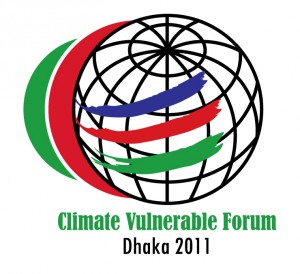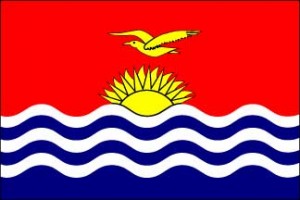November 14, 2011
Statement by Kiribati at the Climate Vulnerable Forum, Dhaka, 14 November 2011
Happy Greetings from our President HE Anote Tong and the people of Kiribati to you all.
I wish to begin by voicing our deep appreciation and great gratitude to the honourable Prime Minister Her Excellency Sheikh Hasina for taking responsibility to accommodate the third meeting of the Climate Vulnerable Forum in their beautiful country of Bangladesh. This affirms the commitments that Bangladesh accords to protect and safeguard the interest of the most vulnerable people on this earth.
I would like to commend the Ministry of Foreign Affairs, Ministry of Environment and Forestry for the wonderful welcome and protocol provided.
It is a great honour and priviledge to meet you all in this important meeting on Climate Vulnerable Forum to share our common vulnerable issues of climate change and to rethink on new ways to address these persistent challenges and issues.
It is very sentimental and sad for all us who are suffering the consequences of climate change that are not our creation, but the creation caused by our big brothers in developed countries.
From science evidence based climate change periodic reports and assessments, it is really alarming to know that there are impacts of climate change that are undeniably avoided. Indeed, there are people in areas and countries who are most vulnerable who are facing greater hardships and sufferings.

This is an urgent call for us now in this forum to think beyond what is happening now. This is the Forum which we should fully utilise to make an effective voice to the industrious world to stop now and think twice of the consequences of their aspirations for advanced economic growth.
DEVELOPMENT CHALLENGES FOR PACIFIC ISLAND COUNTRIES
The people of the Pacific island countries are facing significant development challenges caused by climate change. For smaller island countries like Kiribati, Tokelau and Tuvalu (to name a few), the changing weather patterns have hardly brought rain for more than six months now.
From my recollection of my young life on my island 20 years ago, we used to enjoy good downfall rain at beginning and end of year. I can vividly recall myself enjoying the fullness of these rainy seasons; I could even swim in babai pits as the water was very fresh and good for our babai (taro) root crops.
The adverse impacts of climate change have now brought severe droughts with new emerging problems where babai pits are full with salty water destroying our babai taro root crops. I know that this is really happening as I had witnessed this with my own babai taro roots crops that were suddenly dying away under my nose. Without realising, the water in almost all babai pits in the area where I live were full with salty water – and that was the cause.
“Our people are struggling to survive now during the wake of climate change.“
It was most amazing to learn that the salty water into the babai taro pits did not come from high sea tides invading the land but came from underground. The emerging cause of climate change had allowed sea infiltration from both above and beneath land.
Land degradation and coastal erosion caused by sea infiltration onto and below our land also contributed a lot to the salinity of ground water that our people are depending on for fresh drinking water. I am glad to say that an eyewitness who had seen the sufferings of our people living in degraded coastal areas is a distinguished and honoured Chief Guest, the UN Secretary-General, who paid a visit to Kiribati last October of this year.
The people of Kiribati were deeply touched and inspired by the visit made by the UN Secretary-General, who saw with his eyes the reality of the impacts of climate change in Kiribati.
I must voice again our big thank you to the Secretary-General for having joined the planting of mangroves during his visit. Mangrove planting is one effective initiative to protect coastal erosion and mangroves have significance importance in the lives of our people as its provides a good spawning ground for sea shells that our people are depending on for living.
GREEN GROWTH
We support the move to Green Growth as a means to address the acute food security issue. Given the circumstances on weather and soil conditions, agriculture and farming is a big challenge. This has contributed a lot to our dependency on world food grains with prices that are escalating very fast.
Our people are struggling to survive now during the wake of climate change and rising of prices of these imported food grains. Maybe Green Growth is the answer.
However, developmental opportunities to promote green growth require huge finance and capital and modern technology. We need assistance to address quality water for good irrigation, good modern technology on agricultural machineries and hand tools, and for modern technological food processing facilities.
Share this